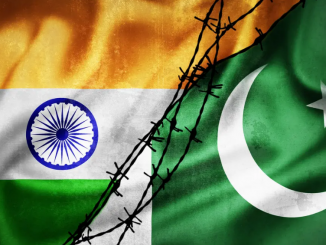
This handout photograph released on May 12, 2025, by the Indian Press Information Bureau (PIB) shows India’s Prime Minister Narendra Modi addressing the nation following a truce with Pakistan, via video conferencing in New Delhi. (AFP/PIB)
| Published May 12, 2025
India and Pakistan agreed to a U.S.-brokered ceasefire following a deadly escalation in Kashmir that brought the nuclear-armed neighbors to the brink of war. The conflict was sparked by a militant attack in Indian-administered Kashmir on April 22, which killed 26 Hindu tourists. India attributed the attack to Pakistan-based groups, leading to retaliatory missile and drone strikes under “Operation Sindoor,” targeting alleged militant camps across the border. Pakistan responded with “Operation Bunyan al-Marsus,” striking Indian military installations. Both sides reported significant casualties, though independent verification remains unavailable.
The ceasefire, facilitated by U.S. Secretary of State Marco Rubio and Vice President JD Vance, was supported by international actors including Saudi Arabia, the UAE, and the UK. Despite the agreement, tensions persist. Indian Prime Minister Narendra Modi emphasized that military action is only paused, warning of swift retaliation against future terrorist attacks. India maintains that discussions with Pakistan will focus solely on terrorism and the status of Pakistan-controlled Kashmir, rejecting broader dialogue or trade talks. Both nations have accused each other of ceasefire violations, and while civilians are returning home and airports have reopened, the situation remains fragile.
Implications of India-Pakistan Ceasefire Agreement
1. Short-Term Diplomatic Relief:
-
Avoiding Full-Scale War: The ceasefire prevents a broader war between two nuclear-armed nations, which would have catastrophic regional and global consequences. It provides a moment of diplomatic relief, but the tension remains high.
-
U.S. Diplomatic Influence: The U.S. successfully mediating the ceasefire boosts its position as a global peace broker, reaffirming its diplomatic influence in South Asia.
2. Persistent Fragility in the Region:
-
Unstable Peace: Despite the ceasefire, tensions between India and Pakistan remain unresolved, particularly regarding Kashmir and cross-border terrorism. The fragile peace is likely to be tested by future provocations.
-
Risk of Future Escalation: The ceasefire might be temporary, and military escalation could resume quickly if either side perceives provocations or violations of the terms. Both nations remain on high alert, with the potential for conflict still looming.
3. Impact on Kashmir and Terrorism Concerns:
-
Focus on Kashmir: India is likely to maintain a hard stance on Kashmir, emphasizing security and anti-terrorism measures in future discussions. The Kashmir conflict remains a flashpoint for future instability.
-
Terrorism as a Central Issue: India’s focus on counterterrorism will shape future negotiations, likely limiting dialogue on broader bilateral issues like trade or regional cooperation, reinforcing the divide between the nations.
4. International Pressure on Pakistan:
-
Global Scrutiny: International actors such as the U.S., Saudi Arabia, and the UAE have shown a vested interest in maintaining the ceasefire. Increased global pressure on Pakistan to control militant groups could alter its internal politics and foreign policy.
-
Pakistan’s Regional Isolation: Pakistan might face increasing diplomatic isolation if it fails to fully adhere to ceasefire terms or if it is seen as harboring militants who target India.
5. Long-Term Regional Stability:
-
Prolonged Tensions: While the ceasefire offers a temporary pause, the unresolved issues around Kashmir, terrorism, and territorial disputes will likely prevent lasting peace without a comprehensive resolution.
-
Potential for Future Negotiations: The U.S.-brokered ceasefire sets a precedent for future negotiations, but its success will depend on both nations’ willingness to engage in meaningful dialogue on sensitive issues, including Kashmir’s status.
Overall Takeaway:
The U.S.-brokered ceasefire between India and Pakistan offers temporary relief from escalating tensions in Kashmir, preventing a potentially catastrophic war between two nuclear-armed nations. While the ceasefire is a diplomatic success, the underlying issues of cross-border terrorism and the Kashmir dispute remain unresolved. Both countries maintain heightened military readiness, and the peace is fragile, with future stability dependent on continued dialogue and adherence to ceasefire terms. The international community, particularly the U.S., has demonstrated its influence in mediating this pause, but long-term peace will require deeper engagement on core issues.





India Exposes China’s Missile Flop: The First Real U.S.-China Clash Explodes?
https://youtu.be/scR49JO41pg